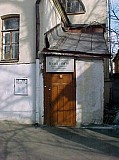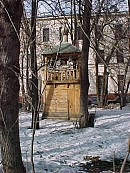The day following the murder of the Emperor's Family, on July 18, 1918, Grand Duchess Elizabeth Feodorovna was atrociously killed not far from Ekaterinburg, together with five of her royal relatives, and the faithful novice, Sister Barbara, who followed her into exile.
Elizabeth Feodorovna was the elder sister of the Empress. A brave and generous woman, whose social life began in the period of the fullest greatness of the Russian Empire and ended tragically in the darkness of a Perin coal mine, where she was thrown by her murderers.
Eight years older than the Empress, she had been raised by her mother, and not by the grandmother, Queen Victoria of England. The mother had instilled in her children that very important principle of Christianity "love thy neighbor." Elizabeth Feodorovna earned the most sincere love in Russia, which had replaced her own motherland, doing innumerable charitable works and continually caring for the happiness of the Russian people.
Having been chosen as the bride of Grand Duke Sergey Aleksandrovich, the young Grand Duchess began to study with intelligence and diligence the Russian people and especially their religion, which had greatly influenced the national character and culture of Russia. Soon the religion of Russia captured her with its beauty, and the Grand Duchess, of her own volition, decided to join the Greek Orthodox Church.
Her husband held the position of governor of Moscow, the true heart of Russia, where the Grand Duchess came into contact with the ancient holy places and with customs of the people of the true Holy Russia. It brought the Grand Duchess closer to her new motherland.
In Moscow, the Grand Duchess quickly became the center of all the social philanthropic activities. During the Russo-Japanese War, she led the women of Moscow in their work to help the soldiers at the front and in the hospitals. She organized the women of all circles of society, from the highest to the lowest, uniting them all in the Kremlin, some rooms of which were changed into workshops. From morning to night, all during the war, this active beehive of women worked for the Army, and the Grand Duchess was happy to see that the great gilded halls of the Kremlin were hardly large enough to hold the crowd of willing workers.
On 4 February, 1905, at the moment when the Grand Duchess was leaving for her workshops, she was alarmed by the sound of an exploding bomb nearby. Hurrying toward the place, she saw a soldier stretching his military overcoat over the maimed body of her husband. The soldier tried to hide the horrible sight from the eyes of the unfortunate wife.
The Grand Duchess dropped to her knees, on the street, put her arms out trying to embrace the torn remains of her husband. From that time on, the Grand Duchess refused the food she was accustomed to, and milk, vegetables and bread became her daily nourishment, even before she took the vows.
The lofty spirit with which she took the tragedy astounded everyone; she had the moral strength even to visit in prison her husband's assassin, Kallaev, hoping to soften his heart, with her Christian forgiveness. "Who are you?" he asked upon meeting her. "I am his widow," she replied. "Why did you kill him?" "I did not want to kill you," he said. "I saw him several times before when I had the bomb with me, but you were with him and I could not bring myself to touch him." "You did not understand that by killing him you were killing me," she said. Then she began to talk of the horror of his crime before God. The Gospel was in her hands and she begged the criminal to read it and left it in his cell. Leaving the prison, the Grand Duchess said: "My attempt was unsuccessful, but, who knows, perhaps at the last minute he will understand his sin and repent."
The murder of Grand Duke Sergey Aleksandrovich brought about a change in the soul of his wife and caused her to withdraw from her former social life. The shock and horror she had experienced left a wound in her heart which healed only when she lifted her eyes to see that which is above this world.
The convent quickly developed, and attracted many nuns from the upper classes as well as from common people. Life within the convent was that of a monastery.
Outside, the sisters' duties consisted in helping the sick, hospitalized in the convent or in their homes, giving material and spiritual help to the poor, and taking care of the orphans and deserted children so many of whom used to perish in the big cities.
A house for young women workers and students were organized to give inexpensive or rent-free lodging to them. There were free hospitals, ambulatories, schools for Red Cross nurses, free kitchens, and, during the war, hospitals for the badly wounded. Sisters of Martha and Mary visited the houses of the poor and sick, took care of the children, did the housework, and brought peace and happiness wherever they went.
Many tiresome duties were performed by the Sister Superior of the convent, Grand Duchess. Innumerable business transactions, consideration of many requests and petitions from every corner of Russia, and other cares, filled her day, sometimes bringing her to a state of complete exhaustion. Nevertheless she often spent the night at the bedsides of critically sick people, or attending the night church service at the Kremlin or some other church popular among the people, or a Moscow monastery. Her soul was stronger than her body. The only rest she got was during the pilgrimages to the holy places of Russia; but the crowds deprived her of peace and solitude. They revered her for her sovereign standing, her goodness and charity, and enthusiastically expressed their affection, turning her trips into triumphant processions. She tried to hide her weariness and appeared before people with a smiling face. Withdrawing from almost everything earthy, she shone with that inner light which comes from the soul, expressing love and tenderness. No one could have been more considerate in giving pleasure and comfort to others, according to each one's spiritual needs.
It is difficult to estimate the amount of money she spent on charity. Her own personal expenses were insignificant. She lived in three small rooms, white and clean, separate from the hospital by the house chapel. They were simply furnished, with wicker chairs, icons on the walls. She slept on a wooden bed without a mattress, on a hard pillow; but after long hours of work she would fall asleep instantly. Often her sleep lasted only three to four hours a day. At midnight she would get up to pray, after which she made a round of the hospital. When the condition of a patient worried her, she would sit at his bedside until dawn trying to ease his sufferings. Intuitive and tactful, she always found the right words of comfort, and the sick testified that her mere presence affected them favorably and relieved their sufferings.
From the very beginning of the war, the Grand Duchess had devoted herself unreservedly to the service of caring for the sick and wounded soldiers, whom she visited in Moscow hospitals and at the battle front.
The communists, after seizing the power during the October Revolution of 1917, to everyone's surprise, allowed the Grand Duchess and all the members of her convent complete freedom; even rendered material support in the way of food supplies. It made it more difficult to bear the sudden blow when, on Pascha, the communists ordered her to leave Moscow and join the Imperial Family in Ekaterinburg. She asked for two hours to make the necessary preparations for the long journey but they were denied. She left with a novice, Sister Barbara, escorted by a convoy of Latvia Guards.
Her future sufferings could have been avoided if she had heeded the words of the Swedish Cabinet Minister who came to Moscow at the request of the German Emperor offering to help her leave the country. She answered him that he was right, that horrible times lay ahead, but she wanted to share the fate of her country and its people. Her decision was of course her own death sentence.
The Grand Duchess was told by the communists that in the South she would be working as a Red Cross nurse. They gave her a private compartment on the train and offered all the comfort. She was happy at the prospective meeting with her sister, the Empress, and ready to serve the people at the new place. Arriving at Ekaterinburg, the Grand Duchess was forbidden contact with the Tsar's family. Sister Barbara succeeded in getting near the house of the imprisoned and seeing (through a crack in the fence) only the Emperor, in the garden or at a window.
The Grand Duchess was temporarily placed in the convent where she was warmly greeted by all the sisters. She especially appreciated the fact that she was permitted to attend all the church services.
In the spring of 1918, soon after the arrival of the Emperor from Perm, there arrived Grand Duke Sergey Mikhailovich with his attendant, F. Remez, three brothers, Grand Dukes John, Constantine and George Constantinovich, and young Count Vladimir Paley, just 20 years old. They were lodged in a dirty town inn. They were all placed in one room, badly treated, and kept half-starved; but they were allowed sometimes to leave the inn which gave them a chance to meet people and even visit old acquaintances.
At the end of May, all the above mentioned and the Grand Duchess were transported to Alapaevsk near Ekaterinburg, and ledged in a school house on the edge of town. Although guarded, the Grand Duchess was permitted to go to church, work in the vegetable garden, where with her own hands she weeded the vegetables and arranged the flower beds; she also painted and prayed. Lunches and dinners were served to her in her room; the rest ate together.
At times the Grand Duchess was able to send words of encouragement and consolation to the sisters of her convent, who deeply mourned her absence.
There was some contact with the population, as among the possessions of the Grand Duchess there was a handmade towel of plain peasant linen with embroidered flowers and inscription: "Dear Mother Grand Duchess Elizabeth Feodorovna, do not refuse to accept in the ancient Russian custom the bread and salt from the loyal servants of the Tsar and the Motherland. Peasants of the Neivo-Alapaevsk district, Verkhotursk county."
Such were the conditions of their life until the fatal night of 18 July. On that night there were suddenly taken to a place 12 miles from Alapaevsk, where all were atrociously murdered. It happened in the Verkhoutsk trace of a mine called "Nizhnaya Selimskaya."
Only Grand Duke Sergey Mikhailovich was shot; the rest were blindfolded and thrown into the mine alive, after which the murderers threw into the mine some hand grenades and then some junk. The mine was about 200 feet deep but the corpses of the Grand Duchess and Grade Duke John Constantinovich were found on a ledge only 50 feet from the top. The Grand Duchess had remained alive for a long time. Near the mine, one could hear the signing of hymnody, which continued through the following day. A peasant driving by on his cart heard the singing. In fright, he drove hurriedly to the camp of the White Army not very distant from there and told them about it. They reproached him for not giving any help, at least by throwing a piece of bread into the mine. When the White Army was able to reach the spot they removed the bodies of the murdered. Investigation showed that the Grand Duchess, herself mortally wounded, had dressed the wounds of Grand Duke John. Near her body were two unexploded hand grenades, on her chest an icon of Jesus Christ. The martyr had sung hymns for herself and for others, funeral hymns, hymns giving thanks or glorifying God, until the hymns of God's Kingdom had sounded for her. Thus the martyr's crown of thorns was placed on her head for her to join the saints.
Grand Duke John Constantinovich always loved the church signing and was the regent of the church choir of the Pavlovsk Palace, and continued to sing in a church choir during his exile in Perm.
Young Count Vladimir Paley, son of the Grand Duke Paul Aleksandrovich, was a talented poet. A number of his verses, which were heard by friends in Ekaterinburg, were written about his exile, where, in his words, "all dear to the heart was so painfully distant, and the enemies so painfully close."
Two of the murderers later became insane shortly after their horrible crime.
By order of Admiral Kolchack, the head of the Siberian White Army, the body of the Grand Duchess and all who were murdered with her were solemnly buried in the Alapaev Cathedral (November 1, 1918). Later, when the White Army had to retreat under pressure of the Reds, the bodies were taken to Irkutsk (July 1919) and later to China (February 28, 1920).
At a point near the Chinese border the communists were able to attack the convoy. They had time to throw out the coffin of Grand Duke John, but some Chinese soldiers arrived in time to stop the sacrilege. On 3 April, the bodies were buried in the Church of St. Seraphim of Sarov at the cemetery of the Russian mission in Peking. Later, the body of the Grand Duchess and that of Sister Barbara, through the care of Princess Victoria, were taken to Palestine. There, on December 15, 1920, they were solemnly met in Jerusalem by the representatives of the English government, by the Greek and Russian clergy, and by innumerable Russian immigrants and local residents.
The Grand Duchess was burned in the Church of Saint Mary Magdalene of Gethsemane, the church built in memory of Dowager Empress Maria (wife of the Emperor Alexander II) by her august children. The Grand Duchess had been present with her husband at its consecration in 1888, and, they say, she liked the church so much that she expressed a desire to spend the last days of her life near it.
"Like a beautiful apparition, she passed through this world, leaving behind her a radiant trail," wrote her biographer, his Eminence Metropolitan Anastassy. "Together with the other sufferers for the motherland she is at the same time the atonement of former Russia, and the foundation of the Russia to come, which will be built on the remains of the new holy martyrs. Such images have lasting significance: their predestination is eternal memory on earth and in heaven. Not in vain had the voice of the people of Russia proclaimed her a saint while she was yet alive. As if to reward her for her glorious deeds on earth, and especially for her love of Holy Russia, her martyred remains (which according to eyewitnesses were found in the mine untouched by decay) were destined to rest near the very place of the sufferings and Resurrection of the Savior."





